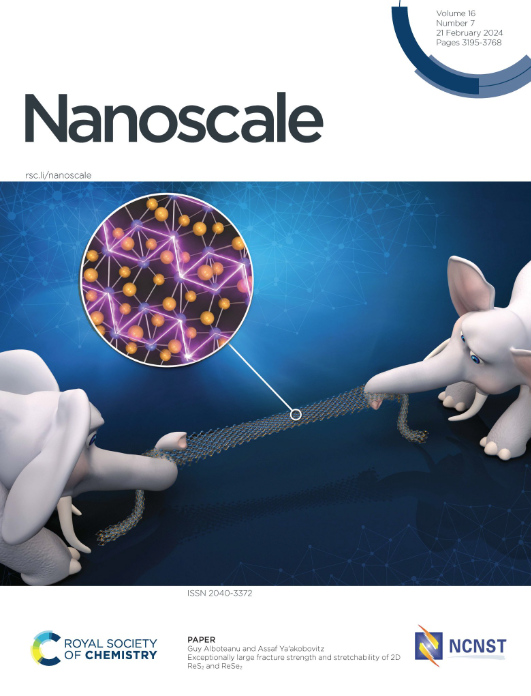Ionic liquid functionalized binary montmorillonite nanomaterials as water-based lubricant additives for steel/steel contact
IF 5.8
3区 材料科学
Q1 CHEMISTRY, MULTIDISCIPLINARY
引用次数: 0
Abstract
Two-dimensional (2D) nanomaterials have attracted much attention for lubrication enhancement of water. Stably dispersing nanosheets in water for an extended period is a challenging task. 2D montmorillonite nanosheets (MMT) are modified by protonic ionic liquid (PIL) with the assistance of simple and efficient mechanochemical synthesis which can stably disperse in water. With the help of TEM, FTIR, and XPS characterization, it is further demonstrated that the one-step mechanochemical stirring synthesis method can introduce the anions and cations of PIL into the MMT interlayer simultaneously, which gives the binary modified MMT some of the advantages of PIL, such as designability and functionalization. The successful intercalation and grafting of ionic liquid between the MMT nanosheets made it possible to obtain ultra-thin thickness and micro-nano size of the binary MMT nanosheets, and the synergistic effect of the 2D MMT nanosheets and the PIL laid a good foundation for the realization of the excellent lubricity, the easy-sliding interlayer structure, and the adsorption of the film more easily. Using the modified MMT nanosheets, the coefficient of friction and wear volume can be reduced by 76% and 94% under high frequency and high load, respectively. The successful intercalation of PIL makes the MMT nanomaterial have better thermal stability and extreme pressure properties, with the maximum bite-free load (PB) being nearly 17 times higher than water. The friction mechanism shows that the enhancement of the lubrication and anti-wear performance is attributed to the boundary adsorbed tirbofilm of MMT nanosheets achieving a repairing effect of the friction interfaces, which provides effective lubrication for steel/steel contact, thus preventing further wear of the friction pair surface. This work provides green, economical guidance for the developing natural water-based lubricant additives and has great potential in sustainable lubrication.离子液体功能化二元蒙脱石纳米材料作为钢/钢接触用水基润滑油添加剂
二维(2D)纳米材料在增强水的润滑性方面备受关注。在水中长期稳定地分散纳米片是一项具有挑战性的任务。二维蒙脱石纳米片(MMT)在质子离子液体(PIL)的帮助下,采用简单高效的机械化学合成方法进行改性,可以稳定地分散在水中。借助 TEM、FTIR 和 XPS 表征,进一步证明了一步机械化学搅拌合成法可以将 PIL 的阴离子和阳离子同时引入 MMT 夹层,从而使二元修饰的 MMT 具有 PIL 的一些优点,如可设计性和功能化。离子液体在 MMT 纳米片之间的成功插层和接枝使得二元改性 MMT 纳米片获得了超薄厚度和微纳尺寸,二维 MMT 纳米片和 PIL 的协同效应为实现优异的润滑性、易滑动的层间结构和更易吸附的薄膜奠定了良好的基础。使用改性后的 MMT 纳米片,在高频率和高负载条件下,摩擦系数和磨损体积可分别降低 76% 和 94%。PIL 的成功插层使 MMT 纳米材料具有更好的热稳定性和极压性能,最大无咬合负荷(PB)比水高出近 17 倍。摩擦机理表明,润滑和抗磨性能的提高得益于 MMT 纳米片的边界吸附钛薄膜实现了摩擦界面的修复效果,为钢/钢接触提供了有效的润滑,从而防止了摩擦副表面的进一步磨损。这项研究为开发天然水基润滑油添加剂提供了绿色、经济的指导,在可持续润滑方面具有巨大潜力。
本文章由计算机程序翻译,如有差异,请以英文原文为准。
求助全文
约1分钟内获得全文
求助全文
来源期刊

Nanoscale
CHEMISTRY, MULTIDISCIPLINARY-NANOSCIENCE & NANOTECHNOLOGY
CiteScore
12.10
自引率
3.00%
发文量
1628
审稿时长
1.6 months
期刊介绍:
Nanoscale is a high-impact international journal, publishing high-quality research across nanoscience and nanotechnology. Nanoscale publishes a full mix of research articles on experimental and theoretical work, including reviews, communications, and full papers.Highly interdisciplinary, this journal appeals to scientists, researchers and professionals interested in nanoscience and nanotechnology, quantum materials and quantum technology, including the areas of physics, chemistry, biology, medicine, materials, energy/environment, information technology, detection science, healthcare and drug discovery, and electronics.
 求助内容:
求助内容: 应助结果提醒方式:
应助结果提醒方式:


